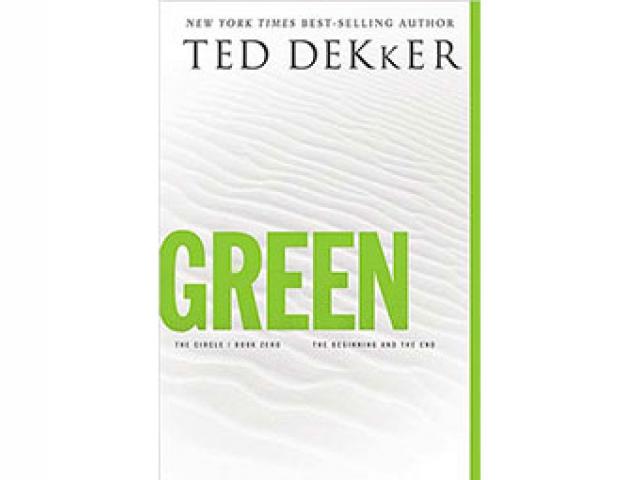Green: Book Review

Ted Dekker is a leader in Christian fiction. His books are some of the edgiest, most thrilling Christian fantasy books out there, from the Blessed series with Bill Bright to the hugely popular Circle trilogy. And now his fans will be excited to hear that the Trilogy just became a little something more with his latest release, Green. This book is being marketed as a completion to The Circle -- the beginning and the end, a book Zero that can be read either before or after the other three, Black, Red, and White.
Some Christians have a problem with the fantasy genre in general, but should that really be a concern?
In his foreword, Ted Dekker says: “In times past, our history has been retold using simple metaphors. Light coming into the darkness. A land called Narnia set free by a lion. A Ring that would enslave the hearts of all. But our generation looks to a new mythology to peel back the layers of truth.”
Ignoring the fact that he’s putting himself in the same league as C.S. Lewis and JRR Tolkien, Dekker makes a great point that Christians can tell stories through fantasy, showing good triumphing over evil, and sharing the message of Christ.
Green's Plotline
Set in both the near-present day and 2,000 years in the future, Green picks up 10 years after the conclusion of White. The members of The Circle, still led by Thomas Hunter and his wife, Chelise, have become a peaceful people, hiding from The Horde instead of fighting them. But some in their ranks are not satisfied with this kind of existence and want to fight back against their enemies instead of doing what they were told by Elyon -- to love unconditionally. More and more of The Circle grow tired of living merely with the past words and revelation of Elyon. Led by Thomas’ own son, this group threatens everything for which The Circle has stood.
The Good in Green
Like all Dekker books, there are some things that he does really well. His use of allegory in this series is amazing. Growing up in a Christian home, it is sometimes easy to let myself skim through the Gospel story. However, reading these books is like being told the awesome story of sin, the Cross, and redemption for the first time, and The Great Romance between Elyon and his people will stir even the hardest heart.
He weaves other Biblical imagery into almost every scene. There is a fantastic moment where Thomas makes a bold challenge to the high priest Ba’al and his group of prophets. Hair will stand on end as they try to evoke their god, Teeleh, to act, and Thomas and his group stand in faith with Elyon. An interesting addition to this installment is the introduction of the Eramites, a group of people that used to be forest dwellers like most in The Circle, but are infected with the disease of The Horde. They are a mixed-breed, having too much of Elyon to be truly happy living with their disease, but also having too much of The Horde to fully give themselves to The Great Romance. Infused throughout the story are reminders of great Biblical principles, subtly melded into the fantasy world.
Green's Weak Areas
However, there are some key weak points to Green. First of all, I would not recommend anyone reading this book before reading the other three books. It is supposed to be the missing link, but it reads more like a fourth book in a series. If you really want to be thorough and understand each facet therein, you should probably read some of Dekker’s other books too, such as the Lost Books series and the Paradise Novels. The character of Billy is especially important in the latter series. Too many characters in Green are not well-developed and you will probably get lost if you have no concept of the story up to this point.
Dekker also uses a fair amount of vampiric imagery, even taking it to the point that he ‘explains’ where vampires actually come from. I’m not sure if that makes me uncomfortable because it’s so extra-Biblical or just because it feels like he’s trying to cash in on the Twilight fan club, but it gets fairly graphic, especially if your heaviest read is normally Christian Romance. Sin is dark and Dekker has always pushed the envelope a bit; still, some of the images in the book are not for the faint-hearted.
The main weak point is that this book and its ending left me unsatisfied, a feeling that I did not have after finishing White. While it is a must-read for any Ted Dekker fan, Green is definitely the weakest link in The Circle.





